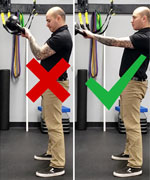5 Common Mistakes Made with The Kettlebell Swing
by William Sturgeon, RKC Team Leader, RKC-II
Learning how to do the kettlebell swing correctly can be a complicated new skill to learn, especially if you’re new to
kettlebell training. Often times there are a few common mistakes that I’ve seen happen when learning the swing. These mistakes can hinder your ability to properly execute the proper training effect and could potentially lead to an injury. In order to ensure that you’re putting your client in the best position to be successful let’s take a look at these common mistakes and how to correct them.
Squatting the swing
Learning the proper hip hinge motion is essential, it is common to see people confuse the squat for a hinge. The difference between a squat and a hinge is the joint being emphasized in the movement. In the squat the knees are the dominate joint involved, with the
kettlebell swing we are emphasizing the hip joint. This is why it’s important
master the hip hinge in order to ensure proper hip mechanics in the swing.
Hinging too early
Low back pain can occur in two ways with the kettlebell swing, one way is hyper lumbar extension, which I will talk about next and the other is lumbar flexion. When you hinge too early with the
kettlebell what is happening here is that the lumbar goes into flexion during the back swing from the arms being too low. This happens when you don’t wait for the bell to push you back versus you hinging back too early. This is why it’s important to master the hike pass and naked swing.
Hyper extending the low back
Another way that low back pain can occur in the kettlebell swing is by hyper extending through the lumbar. When you are at the top of the kettlebell swing your lock out position should create maximum tension at the top throughout the whole body and not your low back. This happens often when you’re not properly firing your glutes to full extension at the top and not bracing at the core. This is why it’s important to master the
RKC plank and the static stomp deadlift.
Arms too high or bent too much
Lastly, which is a very common theme in a lot of new clients being introduced to the kettlebell swing is their arm position. This can either be too high leading to shoulder issues such as shoulder impingement or if the arms are bent too much it can take away muscle contraction of the lats, placing a heavier emphasis on the biceps. Note, that working with clients who are bigger in body size or females’ clients with a bigger bust it is okay to have a slight bend in the elbow. This is why it’s important to master the power swing and hike pass, to help associate the proper lat engagement and positioning of the arms.
Straight Leg Swing
This is when people over exaggerate the hinging motion and go into a straight-legged hinge. It can happen typically when fatigue sets in or overcompensation of the posterior chain. This tends to take power away from the movement and disrupts the proper upper body positioning of having the head, chest, and eyes in forward. This is why it’s important to master the deadlift to ensure that they are sitting back into the glutes.
Learning to master the
kettlebell swing can be complicated, but only if you’re not using the principles and progressions taught in the RKC. The next time you’re struggling with a client and their swing try to revisit some of the exercises listed in this article to help them progress!
 William Sturgeon, RKC Team Leader, RKC II trains clients at his gym, Restored Strength. Contact him through his website at RestoredStrength.com or follow him on Facebook: facebook.com/restoredstrength
William Sturgeon, RKC Team Leader, RKC II trains clients at his gym, Restored Strength. Contact him through his website at RestoredStrength.com or follow him on Facebook: facebook.com/restoredstrength
Back